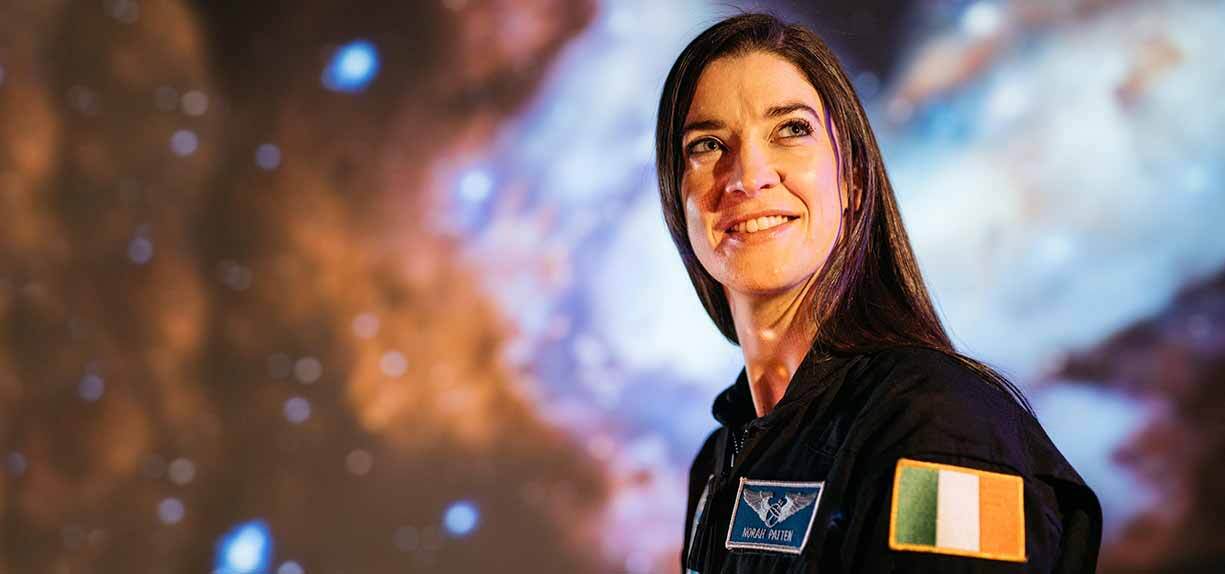Pictured: Dr. Norah Patten, Aeronautical Engineer, Global Faculty, Space University and Bioastronautics Researcher at International Institute for Astronautical Sciences.
Dr. Norah Patten is an Aeronautical Engineer at the Global Faculty of the Space University and a Bioastronautics Researcher at the International Institute for Astronautical Sciences. She is a Citizen Scientist-Astronaut Candidate and an award-winning author and STEM advocate. Her goal is to fly on a suborbital spaceflight.
Dr. Patten will be speaking about space technology in her talk, ‘From Space to Earth’ at Dublin Tech Summit on 31st May at the RDS Dublin.
Here, she speaks with Sarah Freeman, Managing Editor, Business & Finance, about her career to date and plans for the future.
With one week to go before Dublin Tech Summit takes place at the RDS, Dublin from 31st May – 1st June, limited tickets are remaining. Buy here.
What does your job involve? I studied aeronautical engineering, then did a PhD and spent time in the Irish Composites Centre in the University of Limerick. While there, I initiated and managed ‘The Only Way is Up‘ project. Through a partnership with Nanoroacks, this project launched the first secondary school experiment from Ireland to the International Space Station. In 2016, I participated in the New Frontiers Entrepreneurship Program. I worked in partnership with IADT to create ‘Planet Zebunar‘, an augmented reality STEM pack for children. The pack launched in Ireland in 2017 and retailed online and in several stores around Ireland. In 2019, we established the ‘PoSSUM13‘ to engage young females in space science. We came together as 13 PoSSUM candidates and offered teenagers an opportunity to develop an experiment for testing on a microgravity flight. It runs annually and continues today. Now, I’m freelance and I conduct research amongst other projects. My research involves participating in micro-gravity flights on a Falcon 20 jet and analysing the effects of micro-gravity on a variety substances and matter. Just a few weeks ago, I got to fly in a pressurised space suit and look at dexterity and do experiments in the suit and report back on my research. What does it feel like to be in micro-gravity? It’s incredible. You get about 20 seconds of weightlessness on the flight. It’s almost like when you’re under water and you have the sense of weightlessness but you’re still aware of your body. Your hair starts to float and it makes you think, we’re so adapted to life on earth. How important is STEM education in schools? I first got interested in Space when I was 11 years old on a family holiday trip to the NASA Centre in Cleveland, Ohio, U.S. Then, when I was 15 I visited the Kennedy Space Centre and I think that was when I really got fixated on space. I get asked this all the time and I think there are lots of reports to support the importance of STEM in education all the way from pre-school through to secondary. The female representation is so important, boys are still more visible in the STEM fields compared to girls according to recent reports. It really feeds into jobs for the future and the business and economic imperatives. STEM education is important on so many levels and gives pupils problem solving and collaboration skills. These will help them in careers that don’t even exist now. You can see the advance of technology, we need an educated and agile workforce for the future. What does the future hold for space exploration? It’s happening now and I mean, in terms of what I’m seeing, it’s like a renaissance. I’ve been involved with the International Space University since 2010 and I’ve chaired departments and led projects. Back in 2012, it was hosted in Kennedy Space Centre and it was quiet there, the space shuttle had just retired. Fast forward to now, the whole eco-system of commercial activity like human launches from US soil, investment in space has grown phenomenally since 2015, the global space economy continues to grow with commercial activity in low-earth orbit and on the moon. The future is being created right now. What qualities do you bring to your team? There are different skills required for different roles. As far as my role, I’m in training to go to space and that brings with it a real sense of adventure, exploration and the want to push boundaries as well as the desire for me to bring as many people along as possible with me in what I’m doing. The programme I’m doing is geared at the commercial sub-orbital and so I’m working with my research institute and I have full support from them to reach my goal and ambition to get a sub-orbital space flight. I’m fully determined and focused to reaching that goal this year. How is Ireland faring in terms of contribution to and participation in aeronautics? I’m so proud to be Irish. You look at our population size, we punch well above our weight in so many things. There has been a rich history of space over the decades here. In the mid 1800’s you had the largest telescope in the world for years. You have innovative and agile companies, for example the company Réaltra which developed the video system mounted on the launch vehicle for the James Webb Space Telescope. We contribute, as a country, around 25 million euro to the European Space Agency and that money can be drawn down so Irish industry can get really involved in space research and development. Click here for more information on Dublin Tech Summit.



